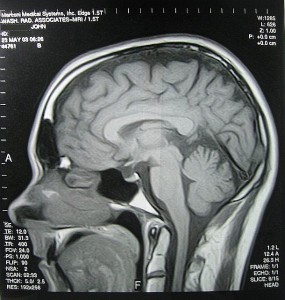Posted at 19 Jun 2014 09:33h
in
Science communications
by Amanda
repeat after me: correlation does not imply causation
In April, the
Journal of Neuroscience published the paper that apparently everybody had been waiting for—definitive proof that even recreational cannabis use messes with your head. As soon as the
publication embargo lifted, the headlines screamed into action, suggesting the danger to developing brains from just a few puffs of weed per week. According to the
press release from one of the associated research institutions, casual marijuana use was linked to brain abnormalities—“more ‘joints’ equal more damage.” Even the paper’s senior author, Hans Breiter, questioned the safety of pot use in anyone under the age of 30.

But is this really what the paper’s results showed?
No.
The study, cross-sectional and retrospective in design, used MRI scans to compare brain morphology of 20 self-reported recreational 18- to 25-year-old marijuana users with appropriately matched controls. At a single interview, each subject estimated their cannabis consumption over the previous 90 days and underwent an MRI scan.
From the results of the neuroimaging interpretations, the researchers found that there were indeed differences in certain areas of the brains of the marijuana users compared with their matched controls
at the time the scans were taken. The intensity of these differences also varied according to the self-reported cannabis intakes in the users—heavier drug use correlated positively with more pronounced changes. Although changes were evident, the authors state at the start of the paper’s discussion that their study group was not large enough and their experimental design was insufficient to determine what caused them.
However, this is not what was widely reported. Instead, headlines announced that recreational pot use damaged young people’s brains. Perhaps the focus was on the abstract, the thumbnail of text at the start of a scientific paper that gives readers a sneak peek at what it’s all about, where the authors state, “These data suggest that marijuana exposure, even in young recreational users, is associated with exposure-dependent alterations of the neural matrix …” Or maybe the writers were swayed by the press release quoting the senior author. … suggests … associated with …
 But is this really what the paper’s results showed?
No.
The study, cross-sectional and retrospective in design, used MRI scans to compare brain morphology of 20 self-reported recreational 18- to 25-year-old marijuana users with appropriately matched controls. At a single interview, each subject estimated their cannabis consumption over the previous 90 days and underwent an MRI scan.
From the results of the neuroimaging interpretations, the researchers found that there were indeed differences in certain areas of the brains of the marijuana users compared with their matched controls at the time the scans were taken. The intensity of these differences also varied according to the self-reported cannabis intakes in the users—heavier drug use correlated positively with more pronounced changes. Although changes were evident, the authors state at the start of the paper’s discussion that their study group was not large enough and their experimental design was insufficient to determine what caused them.
However, this is not what was widely reported. Instead, headlines announced that recreational pot use damaged young people’s brains. Perhaps the focus was on the abstract, the thumbnail of text at the start of a scientific paper that gives readers a sneak peek at what it’s all about, where the authors state, “These data suggest that marijuana exposure, even in young recreational users, is associated with exposure-dependent alterations of the neural matrix …” Or maybe the writers were swayed by the press release quoting the senior author. … suggests … associated with …
But is this really what the paper’s results showed?
No.
The study, cross-sectional and retrospective in design, used MRI scans to compare brain morphology of 20 self-reported recreational 18- to 25-year-old marijuana users with appropriately matched controls. At a single interview, each subject estimated their cannabis consumption over the previous 90 days and underwent an MRI scan.
From the results of the neuroimaging interpretations, the researchers found that there were indeed differences in certain areas of the brains of the marijuana users compared with their matched controls at the time the scans were taken. The intensity of these differences also varied according to the self-reported cannabis intakes in the users—heavier drug use correlated positively with more pronounced changes. Although changes were evident, the authors state at the start of the paper’s discussion that their study group was not large enough and their experimental design was insufficient to determine what caused them.
However, this is not what was widely reported. Instead, headlines announced that recreational pot use damaged young people’s brains. Perhaps the focus was on the abstract, the thumbnail of text at the start of a scientific paper that gives readers a sneak peek at what it’s all about, where the authors state, “These data suggest that marijuana exposure, even in young recreational users, is associated with exposure-dependent alterations of the neural matrix …” Or maybe the writers were swayed by the press release quoting the senior author. … suggests … associated with …



 The thing about academic fair use is that it only covers you when you’re writing for a school of some kind. Even if you’re absolutely faultless in attributing the words you use, the sources from which you derive them and the use to which you put them both bear on what you’re allowed to do. You might need to ask permission to reproduce certain content or certain quantities of it. It’s also possible, depending on what you want to do, that the rights-holder will be entitled to compensation.
The first question I imagine most people will have is, “What are the circumstances under which I can just use whatever I want without asking or paying anyone?” The answer to that is public domain. If the copyright has lapsed, or if the creator has voluntarily released the work into the public domain, then you’re free to do as you like with it. Be aware, though, that
The thing about academic fair use is that it only covers you when you’re writing for a school of some kind. Even if you’re absolutely faultless in attributing the words you use, the sources from which you derive them and the use to which you put them both bear on what you’re allowed to do. You might need to ask permission to reproduce certain content or certain quantities of it. It’s also possible, depending on what you want to do, that the rights-holder will be entitled to compensation.
The first question I imagine most people will have is, “What are the circumstances under which I can just use whatever I want without asking or paying anyone?” The answer to that is public domain. If the copyright has lapsed, or if the creator has voluntarily released the work into the public domain, then you’re free to do as you like with it. Be aware, though, that 

